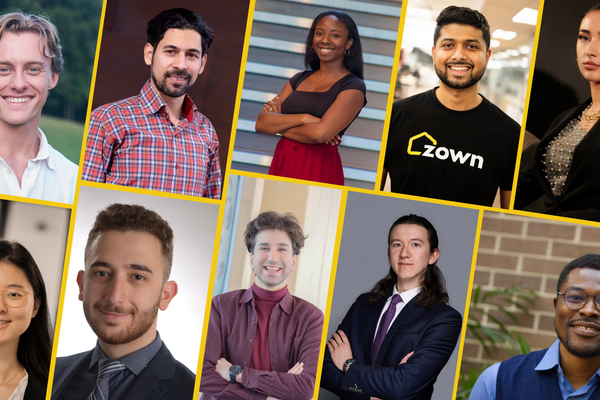
Exercising a passion to help others
Inspired by the memory of a beloved professor, kinesiology student Oumar El-Aina hopes to channel his history of helping into a career in health care.

Inspired by the memory of a beloved professor, kinesiology student Oumar El-Aina hopes to channel his history of helping into a career in health care.
By Carol Truemner Office of AdvancementPassionate about helping people, Oumar El-Aina’s most rewarding University experience has been volunteering his time as an exercise trainer with elderly post-stroke patients and other individuals with mobility issues.
Spending several hours a week at the Faculty of Health’s Centre for Community, Clinical and Applied Research Excellence (CCCARE), the fourth-year kinesiology student works with participants to regain strength and functionality in the centre’s gym.
“I love working with people at CCCARE,” he says. “I’m able to use the knowledge I’ve gained throughout my undergraduate program and my interest in science to benefit them.”
For most of the last year, Oumar has focused his research on restoring and increasing the overall health, wellness, energy and function of individuals living with stroke.
His desire to improve older adults’ mobility makes Oumar the ideal recipient of the Aftab Patla Memorial Award.
The award was established by the Kinesiology Graduate Student Association in memory of Dr. Aftab Patla. The well-respected kinesiology professor devoted his research and teaching career to the study of health, aging and human movement until his death in 2007 from a brain tumour.
Dr. Patla contributed so much not only to his research but the well-being of the Faculty and its students. Being the recipient of this award takes the pressure off me financially and definitely motivates me to do more.
OUMAR EL-AINA, Recipient of the Aftab Patla Memorial Award
Oumar says he enjoys speaking with CCCARE participants to lighten their moods while exercising.
“I consider myself a very social person so it’s nice to get to know them by talking about the Leafs or just about anything.”
On campus, he’s been an orientation leader, leader coordinator, Faculty of Health ambassador, teaching assistant for the School of Anatomy and a research assistant with the Mobilize Clinical Biomechanics Lab in the Department of Kinesiology.
He took to the water as a member of the University’s Dragon Boat Racing team and was the captain of his intramural soccer team, which captured first place in 2022 after placing last a year earlier. Oumar is also the founder and president of the UW Board Games Club.
Volunteering his time for worthwhile causes started early on for Oumar.
As a teenager, he began helping at the House of Friendship, a Waterloo Region-based nonprofit organization that provides food, housing and other assistance to individuals and families.
For years, he filled food hampers, provided translation services and participated in running events for children.
He is now employed by the House of Friendship as a paid community helper and program leader, supporting youth in underprivileged neighbourhoods — including the one he lived in for most of his childhood.
Oumar has his sights on becoming a medical doctor, taking his enjoyment of helping others to a new level.
“I'd love to work with patients in a health and research-based setting,” Oumar says. “I feel as though I would perform well in this challenging, yet rewarding, field.”
He was thrilled to receive the award that honours Aftab, whom he calls his role model.
“Dr. Patla contributed so much not only to his research but the well-being of the Faculty and its students,” he said. “Being the recipient of this award takes the pressure off me financially and definitely motivates me to do more.”

Read more
Donor support has enabled student Isaac Cheng to work on high-profile space projects while sharing his love for physics.

Read more
Here are the people and events behind some of this year’s most compelling Waterloo stories

Read more
From transforming solutions for homeownership to advancing health care interventions, Waterloo talent continues to disrupt industries and drive change
The University of Waterloo acknowledges that much of our work takes place on the traditional territory of the Neutral, Anishinaabeg, and Haudenosaunee peoples. Our main campus is situated on the Haldimand Tract, the land granted to the Six Nations that includes six miles on each side of the Grand River. Our active work toward reconciliation takes place across our campuses through research, learning, teaching, and community building, and is co-ordinated within the Office of Indigenous Relations.